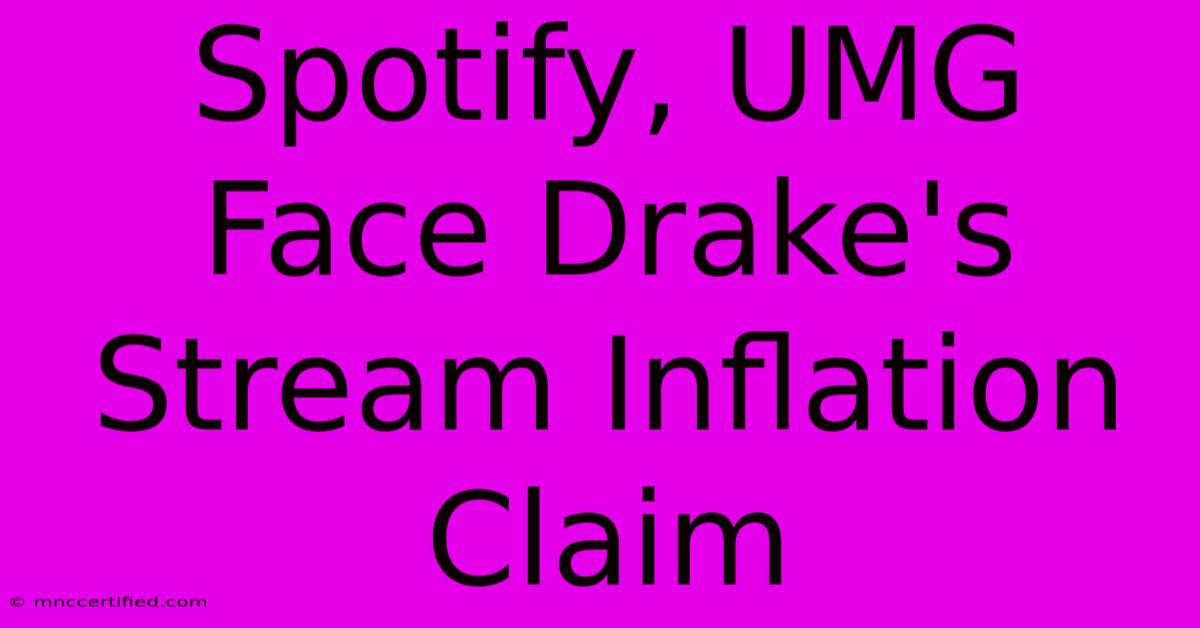Spotify, UMG Face Drake's Stream Inflation Claim

Table of Contents
Spotify, UMG Face Drake's Stream Inflation Claim: A Deep Dive into the Music Industry's Biggest Dispute
The music industry is buzzing with a high-stakes legal battle: Drake and his label, OVO Sound, are accusing Universal Music Group (UMG) and Spotify of artificially inflating stream counts. This explosive claim throws a spotlight on the murky world of music streaming analytics and the potential for manipulation within the industry. This article delves into the details of the dispute, exploring its implications for artists, labels, and the future of music streaming.
Understanding the Allegations: Inflated Streams and Lost Royalties
Drake's claim centers on the alleged manipulation of stream counts on Spotify. The specifics of the alleged inflation remain undisclosed, but the implication is that UMG and Spotify colluded to inflate stream numbers, resulting in underpayment of royalties to Drake and other artists. This isn't just about lost revenue; it challenges the very foundation of trust in the streaming data that determines artists' income. The core of the argument is that accurate streaming data is crucial for fair compensation.
The Role of UMG: A Powerful Player in the Music Industry
Universal Music Group, one of the "Big Three" record labels, holds immense power within the music industry. Their partnership with Spotify, a dominant streaming platform, raises concerns about potential conflicts of interest. Drake's lawsuit alleges that this power dynamic was exploited to manipulate the system to the detriment of artists like himself. The lawsuit claims that UMG leveraged its influence to gain an unfair advantage, potentially influencing the algorithms and reporting mechanisms used to calculate stream counts.
Spotify's Position: A Denial and a Defense
Spotify has vehemently denied any wrongdoing, stating that their systems are designed to accurately track streams. They maintain their commitment to fair and transparent reporting, emphasizing their investments in robust analytics technology. However, the lawsuit's existence suggests the need for increased transparency and independent audits of streaming data to build trust and ensure accountability. The core of Spotify's defense hinges on the reliability and accuracy of their streaming technology.
The Broader Implications: Transparency and the Future of Streaming
This legal battle transcends Drake's individual case. It raises critical questions about the transparency and fairness of the music streaming ecosystem. Many artists have long expressed concerns about the lack of transparency regarding royalty payments, with suspicions of manipulation running rampant. Drake's lawsuit is a catalyst, pushing for greater accountability and potentially leading to significant changes in the industry.
The Fight for Artist Rights: Fair Compensation in the Digital Age
The dispute highlights the ongoing struggle for artists to receive fair compensation in the digital age. Streaming revenue models are often criticized for providing relatively low payouts per stream, especially for independent artists. This legal challenge could lead to increased scrutiny of streaming contracts and a push for more equitable revenue-sharing models.
The Call for Independent Audits and Increased Transparency:
The lawsuit underscores the need for independent audits of streaming data to ensure accuracy and transparency. Currently, artists largely rely on the reporting provided by streaming platforms and their labels, leaving them vulnerable to potential manipulation. Demand for third-party verification of stream counts is growing louder, with artists seeking greater control and understanding of their data.
Conclusion: A Turning Point in the Music Industry?
The legal battle between Drake, UMG, and Spotify could be a pivotal moment for the music industry. The outcome will significantly influence the future of streaming, potentially leading to increased transparency, more equitable royalty structures, and stronger artist protections. The case underscores the importance of fair compensation, accurate data, and independent verification in the increasingly complex world of music streaming. This dispute will likely set a precedent, shaping industry practices and influencing how artists negotiate their deals in the years to come. The debate is far from over, and the world will be watching closely as this high-stakes legal drama unfolds.

Thank you for visiting our website wich cover about Spotify, UMG Face Drake's Stream Inflation Claim. We hope the information provided has been useful to you. Feel free to contact us if you have any questions or need further assistance. See you next time and dont miss to bookmark.
Featured Posts
-
Clarence Seedorf Champions League Debut Menu
Nov 26, 2024
-
Ladbroke Grove Shooting 8 Year Old Girl Injured
Nov 26, 2024
-
Stream Ravens Vs Chargers Monday Night Game
Nov 26, 2024
-
Vic Bond Sales Fenton Michigan
Nov 26, 2024
-
Diblings Low Socks Southampton Fashion
Nov 26, 2024